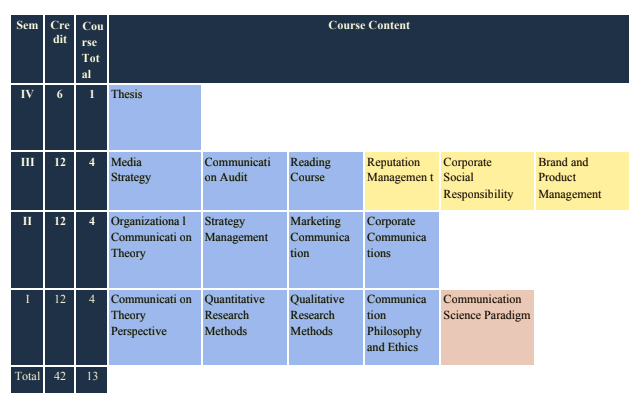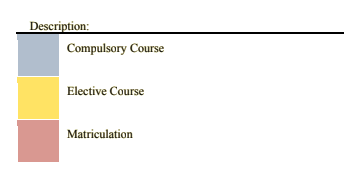The curriculum of the Master of Communication Science Study Programme is prepared based on the profile of graduates. The profile of graduates of the Master of Communication Science Study Programme is as follows :
| No. | Graduate Profile | Profile Description | KKNI |
| 1 | Lecturer | Able to explain the ontological, epistemological, methodological, and axiological philosophy of communication science studies, especially corporate communication in the framework of preparing scientific publications and conducting academic evaluations. | Able to develop knowledge, technology, and or art in their scientific field or professional practice through research, to produce innovative and tested work |
| Able to solve science, technology, and / or art problems in their scientific fields through an inter or multidisciplinary approach | |||
| Able to manage research and development that is beneficial to society and science, and also able to gain national or international recognition | |||
| 2 | Institutional Public Relations Practitioner | Able to design and implement corporate communication and media policies based on organisational performance analysis and corporate communication problem solving in order to develop networks and achieve organisational goals. | Able to develop knowledge, technology, and or art in their scientific field or professional practice through research, to produce innovative and tested work |
| Able to develop knowledge, technology, and or art in their scientific field or professional practice through research, to produce innovative and tested work | |||
| Able to manage research and development that is beneficial to society and science, and also to get the gain national or international recognition | |||
| 3 | Bureaucrat | Able to make decisions in the context of corporate communication policy based on analysis of organisational performance in an effort to solve organisational problems and develop networks. | Able to develop knowledge, technology, and or art in their scientific field or professional practice through research, to produce innovative and tested work |
| Able to solve science problems, technology, and or art in their scientific fields through an inter or multidisciplinary approach | |||
| Able to manage research and development that is beneficial to society and science, and is able to gain national or international recognition | |||
| 4 | Entrepreneur | Able to utilise the scientific principles of corporate communication in the framework of business development through organisational performance analysis, marketing and media communication policies, and network development. | Able to develop knowledge, technology, and / or art in their scientific field or professional practice through research, to produce innovative and tested work |
| Able to solve science, technology, and or art problems in their scientific field through an inter or multidisciplinary approach | |||
| Able to manage research and development that is beneficial to society and science, and is able to gain national or international recognition | |||
| 5 | Media Workers | Able to develop strategic media planning and policies based on the scientific principles of corporate communication and develop and maintain networks. | Able to develop knowledge, technology, and or art in their scientific field or professional practice through research, to produce innovative and tested work |
| Able to solve science, technology, and or art problems in their scientific field through an inter or multidisciplinary approach |
Graduate Learning Outcomes and Study Materials Master of Communication Science
| Code | Description of Study Program SLOs | Study Material |
| Attitude | ||
| S1 | Behave in accordance with the values of Godliness, discipline, creativity, entrepreneurship, resilience, honesty, excellence, and bela negara in carrying out work in their fields of expertise | Communication ethics Communication audit Branding Marketing |
| S2 | Implement tolerance, nationalism, responsibility to the state, nation, and profession as well as respect for culture and religion in improving the quality of life based on Pancasila | Organizational responsibility Communication ethics public relations |
| Knowledge | ||
| P1 | explain ontological, epistemological, axiological, and methodological philosophies in the study of communication science, especially in regard to corporate communication. | Epistemological, ontological, axiological philosophy Research Methodology Academic writing |
| P2 | Analyse corporate communication phenomena in accordance with communication theories. | strategic Planning Organizational Communication Organization Performance Organizational climate and culture Reputation |
| P3 | Apply communication theories to produce policy designs and social engineering models in contribution to solve corporate communication problems | Communication theory Decision making Technology in communication |
| P4 | Explain derivative theories and concepts in the field of corporate communication studies to solve problems critically and academically | Corporate communication Organizational HR Management |
| General Skills (KU) | ||
| KU1 | Carry out academic validation and learning capacity improvement independently within the field of corporate communication in their attempt at solving problems in society or relevant industries through the development of knowledge and expertise. | Research methodology Academic writing Decision making Communication theory |
| KU2 | Disseminate ideas, thoughts, and arguments that are formulated according to scientific rules and ethics according to their respective scientific fields in the form of theses, scientific articles, and multiplatform media articles in the pursuit of scientific development. | Research methodology Academic writing Media Public relations |
| KU3 | Make decisions based on analytical or experimental studies of information and data by applying humanities values according to the field of duty. | Decision making Research Methodology Communication Audit Strategic management |
| KU4 | Manage networks of colleagues both within and outside of the institution to support self and institutional development | Corporate Communications Public Relations Communication Ethics Organizational Reputation Branding |
| Special Skills | ||
| KK1 | Diagnose organisational performance through a communication auditing process that is necessary for improving organisational capacity and performance | Communication Audit Organizational Performance Organizational climate and culture Strategic Planning Corporate Communications |
| KK2 | Design media policy, media planning, marketing communication planning that are strategic and research-based for the benefit of organisations and corporations. | Branding Media Communication and business Marketing and advertising Public relations Decision making Communication ethics |
| KK3 | Evaluate organisational and corporate problems in the community according to their respective scientific competence in the field of corporate communication. | Communication Audit Organizational climate and culture Organizational Performance Technology in Communication |
| KK4 | Carry out appropriate research methods and scientific development in the field of corporate communication | Research Methodology Academic Writing Communication audit |
Course Organization


